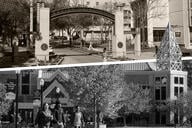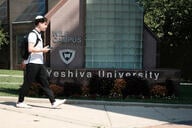You have /5 articles left.
Sign up for a free account or log in.
Arizona State University students will soon be able to take classes in theology and Catholic studies through a partnership with the University of Mary, a Roman Catholic institution in Bismarck, N.D.
Religious leaders and administrators at both universities cheered the agreement as a way to build student communities and to provide to Catholics at Arizona State opportunities for serious academic work and religious inquiry.
Others questioned whether the partnership violates the constitutionally mandated separation of church and state, though leaders at both colleges say they’ve taken steps to mitigate those concerns.
The classes will be offered staring this fall in Arizona State’s Catholic student center and will be taught by faculty hired by the University of Mary. Students will pay tuition to the University of Mary and have their work applied to Arizona State degrees as transfer credits, though they will know before enrolling whether the Mary class will count toward their degree. Students can also pursue majors or minors in theology or Catholic studies through the partnership, credentials that would be awarded by Mary. Students will pay tuition at Mary's rates, which for this year was $435 per credit hour for part-time students. It's hard to compare that directly to Arizona State because the institutions calculate their fees differently, but an in-state freshman at Arizona State paid about $650 per credit hour this year and an out-of-state freshman paid about $900.
The courses will be open only to Arizona State students, who need not be Catholic to enroll. No money has been exchanged between the colleges.
The financial separation is a key point, said Seráh Blain, executive director of the Secular Coalition for Arizona. So long as public money isn’t supporting the Mary classes, she isn’t troubled.
“As long as it’s not state tax dollars supporting religious instruction, I certainly wouldn’t see a problem,” Blain said. “In general, secularists support religious pluralism so we absolutely would not have any problem with students seeking religious education.”
Like most large research universities, Arizona State has long had religious studies faculty who teach for-credit classes on religion objectively instead of prescriptively. The college also has organizations for students of various faiths. Such programs are widely accepted.
But Alex Luchenitser, associate legal director at Americans United for Separation of Church and State, questions whether the partnership with Mary crosses legal lines.
“This seems like a special relationship between a religious university and a state university,” he said. “That can create an impression that this university endorses this particular institution or the Catholic religion specifically.”
Fred Corey – a vice provost, dean and school director at Arizona State – said there is no such endorsement. The campus is home to a large Mormon student center, where noncredit classes are offered, and is open to partnering with other religious groups to offer programs, he said.
Working with Mary is a way to better serve Catholic students and others looking to learn more about that faith, Corey said, but it doesn’t amount to religious favoritism.
“The university is not going to participate in any dogma,” he said, “but for students who want to pursue religious traditions and ask very hard questions about values, the university should be here to facilitate that process.”
The Rev. James Patrick Shea, the University of Mary’s president, said his college’s involvement isn’t a mislabeled missionary program. Rather, he said, it’s an attempt to bring new academic programs to a state without any Catholic colleges.
“We’re not here due to proselytism," he said. “We want to bring real, engaged academic programs. Theology is a real discipline -- these aren’t insignificant things.”
Most students on Mary’s North Dakota campus aren’t Catholic, he added, proving that “we don’t engage ourselves in higher education simply out of evangelistic motives.”
The Rev. Thomas J. Olmsted, bishop of the diocese of Phoenix, applauded the program at a press conference Thursday. The partnership could foster much-needed collaboration between the state’s religious and public sectors, he said.
“The founders of the state of Arizona believed in the complementary relationship between church and state,” Bishop Olmsted said. “I’m confident God will enrich the academic and cultural pursuits of the students who will be part of this initiative.”
Elsewhere, Christian ties to public higher education have faced recent challenges. The University of Illinois at Urbana-Champaign received criticism after an adjunct professor of Roman Catholicism made remarks about homosexuality that some considered hate speech. He retained his job, but the university called off a partnership in which the Catholic Church paid the instructor’s salary.
At Iowa State University, a Protestant finance professor’s proposed class on Biblical business principles was canceled after his colleagues argued it breached the separation of church and state.
While Arizona State and Mary have cooperated to line up class schedules at ease transfers, administrators at both colleges said their academic offerings will remain distinct.
Luchenitser, the Americans United attorney, said the steps taken to keep the universities separate could help defray some legal concerns. But having a special partnership in itself presents questions of how separate the church and state are, he said.
“It would be fine legally if the public university let their students take classes from all outside universities,” Luchenitser said. “But to enter into a special relationship with one Catholic institution we think poses some very serious constitutional issues.”
Arizona State students can, of course, enroll in courses wherever they like and then try to transfer them back to Tempe. The Mary program is unique in offering a clear relationship between two institutions and in offering courses near the Arizona State campus and on ASU's academic calendar.
Corey said the partnership is 18 months in the making and that it never encountered serious internal concerns at Arizona State. That said, he said he welcomes healthy discussion on a public university’s role in providing opportunities for theological studies.
“Contestation is a healthy activity,” he said. “If there’s healthy protest, the end result can only be a good thing. In the end, there is a separation between Arizona State University and the University of Mary. It’s not the same institution. I don’t believe that one institution is going to influence the other.”




